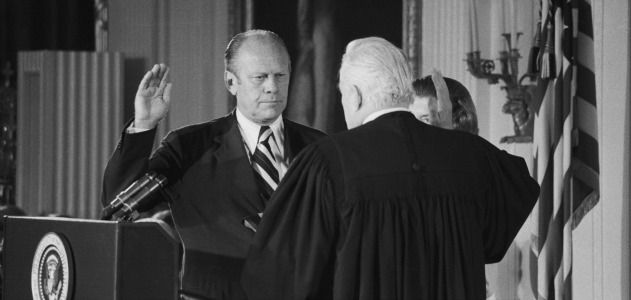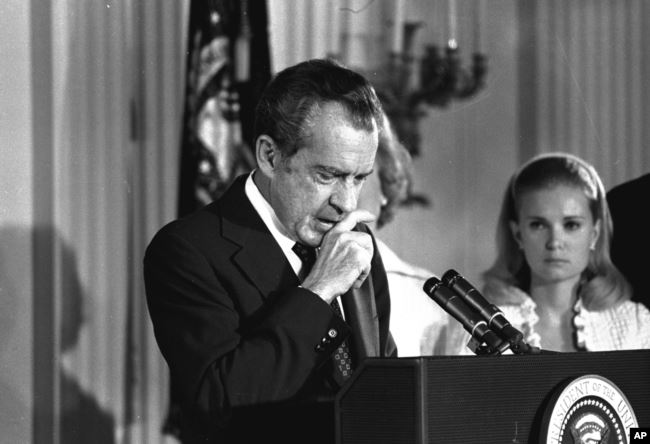No products in the cart.

On August 8, 1974, the 37th President of the United States of America, Richard Nixon announced his resignation due to the Watergate scandal. Nixon remains the only President of the United States to resign the office to this day.
Contents
In light of the resignation, Vice-President Gerald R. Ford ascended the presidency, the next day, and became the 38th President of the United States.
President Ford would later give Nixon a full pardon, preventing the former president from being prosecuted on any charges connected to the Watergate scandal.

This article describes the resignation of President Richard Milhous Nixon and the swearing-in of the new president, Gerald Ford on August 9, 1974.
Washington, August 9, 1974
Gerald R. Ford, a calm and easy-going man from Michigan, took charge today as the thirty-eighth President of the United States, telling the country that “our long national nightmare” of Watergate is over.
In an inaugural address immediately after taking the oath of office in the East Room of the White House, Ford offered an “unprecedented compact with my countrymen” and asked the nation “to confirm me as your President with your prayers.”
Describing his brief speech as “just a little straight talk among friends,” he pledged himself to truth, “openness and candour” in government and promised the nation and the world “an uninterrupted and sincere search for peace.”
The new President took the oath of office 28 minutes after the resignation of Nixon took effect. Technically Ford was the President as of the moment of Nixon’s resignation.

Richard Nixon announced his unprecedented decision to resign in a televised speech to the nation last night in which he mentioned Watergate only once but never referred to or admitted personal guilt for the cover-up.
Swearing in of President Gerald Ford
Gerald R. Ford took the oath of office as President at 12:03 p.m. (Eastern Daylight Time) today from Chief Justice of the United States Warren E. Burger.
The East Room, which less than three hours earlier had been the scene for President Nixon’s unusual and tearful farewell to members of his staff, was crowded with the political and personal friends that Ford had made in the quarter century he has spent in the House of Representatives and the eight months he has served as Vice President before ascending to the presidency.
Today’s changeover marked the first time that an American President had resigned from office.
The stage was set for the transfer of power as Chief Justice Burger asked Mr Ford, “Mr Vice President, are you prepared to take the oath as President of the United States?”
The President-to-be replied, “I am, Sir.”
Then, Mr Ford repeated the oath of office after Burger:
“I, Gerald R. Ford, do solemnly swear that I will faithfully execute the office of the President of the United States and will to the best of my ability preserve, protect and defend the Constitution of the United States.”
The crowd in the East Room—members of the Nixon Cabinet, leaders of Congress, old friends of the Ford family—applauded.
President Ford and his wife, Betty, stood on the dais smiling.
Richard Nixon’s Farewell
The atmosphere in the mansion was far different from what it had been just a few hours earlier. Then it was strained, tense and tearful as former President Nixon bade farewell to his staff members and other officials of Government.

In this vein, President Ford repeated his request for the nation’s prayers, but not only for himself:
“Before closing, I again ask your prayers for Richard Nixon and for his family. May our former President, who brought peace to millions, find it for himself. May God bless and comfort his wonderful wife and daughters, whose love and loyalty will forever be a shining legacy to all who bear the lonely burdens of the White House.”
President Ford said he was “acutely aware” that he had not been elected President by the nation, but added:
“If you have not chosen me by secret ballot, neither have I gained office by secret promises. I have not campaigned either for the presidency or the vice-presidency.
“I have not subscribed to any partisan platform, I am indebted to no man and only to one woman—my dear wife, Betty—as I begin the most difficult job in the world.”
Candidly, Ford referred to the wounds inflicted on the nation by the Watergate scandals.
“As we bind up the internal wounds of Watergate, more painful and more poisonous than those of foreign wars, let us restore the golden rule to our political process and let brotherly love purge our hearts of suspicion and hate.”
A Solidarity for Ford
In a show of initial friendliness, Congress quickly adopted a resolution today giving President Ford its “assurances of firm co-operation and its fervent hopes for success in office.” The resolution was adopted in the Senate by voice vote without debate and dissent. The House then approved it 328 to 0 without debate but with standing applause for its former Republican leader.
Then in the simple terms that are characteristic of Gerald Ford, the man from Grand Rapids, Michigan, renewed the promise he had made when he assumed the vice-presidency on December 6, 1973.
“To uphold the Constitution, to do what is right as God gives me to see the right and to do the very best I can for America. God helping me, I will not let you down.”
President Ford told of his earnest desire for peace and friendship. He said:
“To the peoples and governments of all friendly nations—and I hope that could encompass the whole world—I pledge an uninterrupted and sincere search for peace.
“America will remain strong and united, but its strength will remain dedicated to the safety and sanity of the entire family of man, as well as to our own precious freedom.”
Ford promised openness and truth:
“I believe that truth is the glue that holds government together, and not only government but civilization itself. That bond, though strained, is unbroken at home and abroad. In all my public and private acts as your President, I expect to follow my instincts of openness and candour with full confidence that honesty is always the best policy in the end.”
Gerald Ford’s address was delivered in the same East Room where former President Richard Nixon had said goodbye to his Cabinet and White House aides only hours before.
Then the first speech of President Ford was over.
A New Chief in the White House
The Bible on which Ford’s hand rested as he took the oath of office was opened to Proverbs, chapter three, verses five and six. It was said that Gerald Ford learned these verses many years ago and frequently says them as a prayer. They state:
“Trust in the Lord with all thine heart,
And lean not unto thine own understanding.
In all thy ways acknowledge Him, and He shall direct thy paths.”
President Ford wore a dark suit, white shirt and striped tie for the ceremony in the East Room.
There was an expectant happy hubbub as the crowd awaited his entrance. Secretary of State Henry A. Kissinger and his wife, Nancy, were particularly animated as they chatted with Cabinet members and other government officials.
It was all over in a few moments. The new President was in command.
“We Leave Proud”
This morning, President Nixon bade a personal farewell to members of his Cabinet, staff and others in the East Room of the White House in an unusual, tearful address in which, without mentioning Watergate he said adversity was not the end but a new beginning and asserted that “we leave proud.”

President Gerald Ford escorted Richard Nixon and his family to a helicopter, which took the Nixons from the White House to Andrews Air Force base in nearby Maryland for the flight to the Nixon home in San Clemente. Before he arrived there, the mantle of the presidency had passed to Gerald Ford, and Richard Nixon was no longer Chief Executive but only an American citizen.
The Accidental President
Gerald Ford was the first President to take the oath in the White House since Harry S. Truman succeeded to the presidency on the death of President Franklin D. Roosevelt in 1945.
Ford, who has been Vice President for only eight months, promised a “smooth and orderly transition” in a “spirit of cooperation” with Congress, a continuation of President Richard Nixon’s foreign policy and a quick start on serious domestic problems.
His voice shaking with emotion as he met the public on his suburban front yard last night, Gerald Ford said his goal as President would be “what’s best for America and the world.”
Ford was solemn and unsmiling as he spoke informally to a small crowd of enthusiastically applauding neighbours and visitors in front of his house in Alexandria, Virginia.
“I think that this is one of the most difficult and saddest periods and one of the very saddest incidents that I have ever witnessed,” Ford said of the President’s address.
“I think the President has made one of the greatest personal sacrifices for the country and one of the finest personal decisions on behalf of all of us as Americans by his decision to resign as President of the United States.”
The Embattled Nixon
Now deprived of the protection of his office, Richard Nixon himself faces the possibility of prosecution in connection with scandals that already have led to the indictment or conviction of at least 16 former members of his administration and campaign organisation, including his former Vice President, Spiro T. Agnew, and four cabinet officers.
There was immediate criticism from members of Congress of President Richard Nixon’s failure to admit his own guilt and of his assertion that he was resigning because the Watergate affair had deprived him of an effective political base in the House and Senate.
A number of members of Congress said that before last night’s address is to be acceptable, the President’s resignation must be accompanied by some statement of his own culpability. In the absence of such an admission, some members of Congress have suggested proceeding with the impeachment of Nixon. However, this was generally regarded as only a slim possibility; some congressional leaders oppose the step.
President Richard Nixon’s decision to step aside brought him and the country to the end of the long and tortured period that began in the early hours of June 17, 1972, when five burglars were captured in the Watergate offices of the Democratic National Committee.
The Watergate Scandal: How Richard Nixon Resigned
The Watergate affair spread to include a broad assortment of crimes by those close to the President as investigations disclosed perjury, political espionage and sabotage, the existence of a secret squad of investigators in the White House, payoffs and bribery, and subversion of federal agencies.
The details came out in the President’s secret tapes, in the Senate Watergate hearings, in prosecutions in court and in the impeachment proceeding against the President.
At the moment Nixon reached the end of the trail and told the nation last night, “I shall resign the presidency…” a sustained cheer rose from a jubilant crowd of several hundred persons gathered in Lafayette Park, across the street from the White House.
The President’s resignation climaxed an extraordinary three-day period in which it had become increasingly apparent that resignation was inevitable.

The pressure began to build Monday night with the release of transcripts of three presidential conversations showing Nixon was involved almost from the start in the Watergate cover-up. A wave of outrage swept through Congress, wiping out President Nixon’s remaining support there and making his impeachment and conviction by overwhelming majorities a virtual certainty.
Demands for President Richard Nixon’s ouster were heard on all sides. After three days of uncertainty and rumour, he finally made up his mind. Last night, he called in leaders of Congress to tell them what he would do. A little later he told the nation of his decision in a 16-minute televised address.
President Richard Nixon’s Resignation
“I shall resign the presidency effective at noon tomorrow,” Nixon said. “Vice President Ford will be sworn in at that hour in this office.”
The President was composed throughout the address but appeared to be making an effort to control his emotions. He smiled briefly at the start and once or twice again.
Near the end, as he spoke of “my legacy to you, to our country, as I leave the presidency,” he blinked several times.
On the Watergate scandals, Nixon said:
“I have concluded that because of the Watergate matter I might not have the support of the Congress that I would consider necessary to back the very difficult decisions and carry out the duties of this office in the way the interests of the nation would require.”
The closest President Nixon came to conceding his own involvement was his statement that “if some of my judgments were wrong—and some were wrong—they were made in what I believed at the time to be the best interest of the nation.”
He expressed regret for any injuries that might have occurred.

Besides the lack of “a strong enough political base in the Congress” to justify his continued fight against impeachment, Nixon gave only one other reason for his decision to step down. He said:
“America needs a full-time President and a full-time Congress, particularly at this time with the problems we face at home and abroad. To continue to fight through the months ahead for my personal vindication would almost totally absorb the time and attention of both the President and the Congress in a period when our entire focus should be on the great issues of peace abroad and prosperity without inflation at home.”
Nixon made it clear that he would have liked to continue to fight. “I have never been a quitter,” he said almost vehemently.
“To leave office before my term is completed is abhorrent to every instinct in my body. But as President, I must put the interest of America first,” he said.
The rest of the President’s address was devoted to the praise of Vice President Ford, a call for America to rally behind its new President and the recital of his own accomplishments in the field of foreign policy.
Finally, President Richard Nixon closed with a prayer: “May God’s grace be with you in all the days ahead.”
The Accession of Vice President Gerald R. Ford
The accession of Vice President Gerald R. Ford to the presidency marks the first time the United States of America has had a President who was not chosen in a national election either as President or Vice President. The same condition will be true of the Vice President whom President Ford is expected to select soon.
In his brief remarks last night outside his home in Alexandria, Virginia. President Ford stressed his determination to cooperate with Congress to solve domestic problems and held out an olive branch to Democrats, saying in his calm, low-keyed way:
“I have been very fortunate in my lifetime in public office to have had many adversaries in the arena of the Congress, but I don’t think I have a single enemy in the Congress.
“The result is I think I can start out tomorrow working with Democrats as well as Republicans in the House of Representatives and the Senate on the serious problems we have at home.
“The spirit of co-operation that I think will be demonstrated between the Congress and the President will be beneficial to the country and to the world. I pledge my best effort in cooperation, leadership and dedication to what is good for America and good for the world.”
He praised Secretary of State Henry A. Kissinger as “a very great man … who has helped to build the blocks of peace under President Nixon.”
Announcing that Kissinger will continue to head the State Department, President Gerald R. Ford said that he would continue the foreign policies designed by the Secretary of State.
President Richard Nixon’s address last night capped a day in which, although there was no formal announcement, it was taken for granted that after two years of insisting that he would not resign, he was indeed about to take exactly that unprecedented step.
Nixon met with Alexander M. Haig Jr., his chief of staff, yesterday morning. Then at 11 a.m., the President called in Vice President Ford for a 70-minute private talk in the oval office. Gerald Ford was informed then that he was about to become President.
However, on September 8, 1974, a month after his resignation, President Ford granted a full, free and unconditional pardon to Nixon.
We always have more stories to tell. So, make sure you are subscribed to our YouTube Channel and have pressed the bell button to receive notifications for interesting historical videos. Also, don’t hesitate to follow us on all our social media handles and to as well share this article with your friends.
Feel free to join our YouTube membership to enjoy awesome perks. More details here…
Sources
Gray, K. and Effron, L. (2017, June 15). How President Richard Nixon spent his last day in the White House. abc NEWS. Retrieved from https://abcnews.go.com/Politics/president-richard-nixon-spent-day-white-house/story?id=47914193
Kilpatrick, C. (1974, August 9). Nixon Resigns. Washington Post. https://www.washingtonpost.com/wp-srv/national/longterm/watergate/articles/080974-3.htm
Ottenad, T. (1974, August 9). President Nixon Resigns, Gerald Ford Takes Oath. St. Louis Post-Dispatch. Retrieved from Microsoft Encarta 2009.
Peters, G. and Woolley, J. (n.d.). Gerald R. Ford, Remarks on Taking the Oath of Office Online. The American Presidency Project. Retrieved from https://www.presidency.ucsb.edu/node/255838
The New York Times. (1974, August 9). Transcript of President Nixon’s Address to the Nation Announcing His Resignation. The New York Times. Retrieved from https://www.nytimes.com/1974/08/09/archives/transcript-of-president-nixons-address-to-the-nation-announcing.html
Leave a Reply
You must be logged in to post a comment.









Leave a Reply